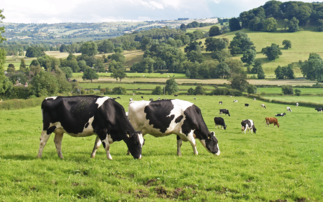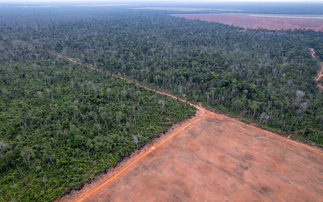Ensuring a thriving underwater ecosystem is a key part of the SDG14 agenda - here Simon Hillbourne of the Fish-Free February campaign argues cutting fish from diets can help highlight the importance of sealife to the planet
Manta rays are one of the most charismatic, captivating, and enigmatic creatures in our oceans. For decades they have been well known and adored by scuba divers and snorkelers alike. For those who don't have a close association with the oceans, these gentle giants present a species through which people can connect and fall in love with the marine world.
Unfortunately, the long-term survival of manta rays and their relatives is not certain. Manta rays are large bodied, late to reach sexual maturity, invest a lot of energy into courtship and reproduction, and only foster a single pup every two to seven years. These life history characteristics make manta rays particularly vulnerable to population decline. Through targeted or accidental by-catch around the world, fisheries pose the largest threat to these graceful creatures, with the international trade of gill plates (used in Chinese medicine as pseudo-remedies) being the primary driver of mobulid fisheries. As a result, some mobulid populations have exhibited regional declines of over 80 per cent. However, the threat of over exploitation from fisheries is one faced not just by manta rays, but countless other marine species as well.
As technology has developed, fishing fleets have been able to travel further, fish deeper, harvest more intensely, and stay out at sea longer, to the point where industrial longliners can spend many months at sea laying 50km of baited hooks, stopping only to transfer catches to reefer ships. The oceans are rapidly being depleted and we need to protect much greater areas of this common resource if we want to stand any chance of safeguarding the world's charismatic species, like manta rays, from extinction in the next few decades.
The United Nations is attempting to address global challenges by setting out 17 Sustainable Development Goals (SDG) to provide 'a shared blueprint for peace and prosperity for people and the planet, now and into the future'. At the Manta Trust, our research and conservation efforts are already contributing towards achieving eight of these goals. Goal number 14 is the most relevant to our cause and pertains to 'Life Below the Sea; to conserve and sustainably use the oceans, seas and marine resources for sustainable development'. Although targets set out under this goal are admirable, many have already noted that progress has been disappointing, and some targets may be unachievable now.
National and international policy change is slow to keep abreast of scientific advice. Lobbied aggressively by fishing industry heavyweights, which often prioritise profit over the wellbeing of our planet, much of the legislation regarding suggested quotas and sizes of marine protected areas falls short of what scientists and conservationists advise.
Whilst scientists, conservationists, politicians, and fishing industry representatives deliberate on quotas and protected areas, species, and minimum landing sizes, the onslaught on global fish stocks and by-catch species continues. The good news is that as consumers we have the power to make a real difference for manta rays, devil rays and other marine species, in our daily life - simply through the food that we choose to eat.
Following the rippling blue tide of ocean awareness brought about by the so-called 'Attenborough effect', the general public is waking up to the plight of the world's oceans. Reducing meat and dairy consumption has been a hot topic recently, but why should fish be left out of the picture? This was the impetus behind the Fish-Free February campaign launched by Manta Trust. We are already working closely with artisanal fisheries in developing countries to find more sustainable fishing practices and alternative livelihoods, because we appreciate that many coastal communities are dependent on fishing to survive. At a global level, however, we feel there must be a reduction in seafood consumption.
The campaign encourages people to stop eating seafood throughout February, raising awareness of the negative effect of the fishing industry on our oceans, with the ultimate vision of a radical reduction in seafood consumption and opting for sustainable practices when fish is purchased.
Overfishing of targeted species, excessive by-catch of non-target and sometimes endangered species, mis-labelling of products and consumers being midled, plastic pollution from fisheries in the form of ghost nets, and the hugely destructive impact of some aquaculture industries - these are just a few of the issues surrounding commercial fisheries that Fish Free February is highlighting.
For the 90 per cent of global stocks which are fished to their maximum or even over fished, the 100 million sharks and hundreds of thousands of mobula rays caught every year, and demersal ecosystems routinely scoured by trawlers, a Fish Free February could be the start of the breather they so desperately need.
Simon Hillbourne is a marine biologist, digital media and communications manager for the Manta Trust, and creator of the Fish-Free February campaign








